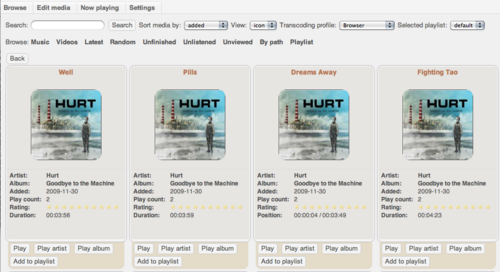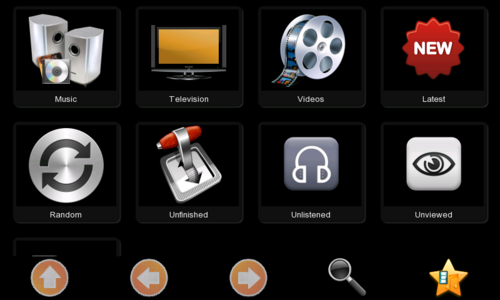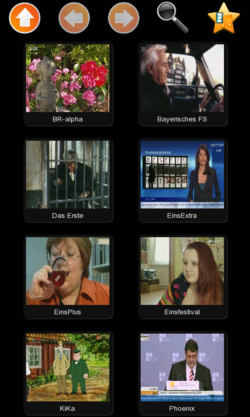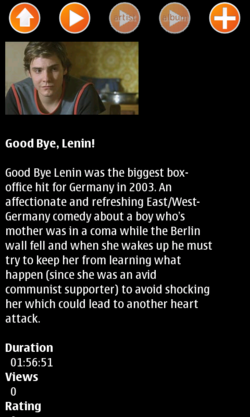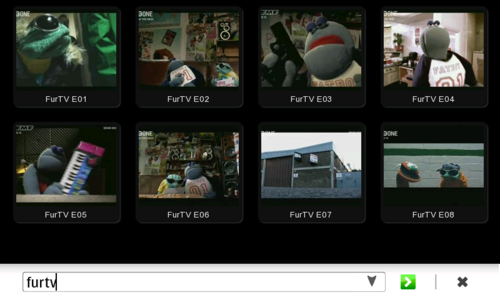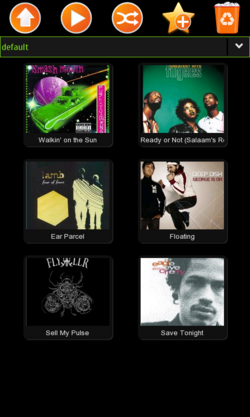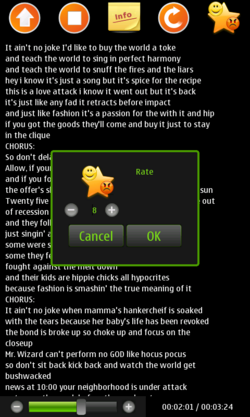Knots2
(→Linux) |
(→Windows) |
||
| Line 71: | Line 71: | ||
===Windows=== | ===Windows=== | ||
| - | Download the [http://nakkiboso.com/knots2/ | + | Download the [http://nakkiboso.com/knots2/knots_setup_2010_05_24.exe installer] (Updated 2010-05-24). Install and start the server from the start menu. Then select Configure server from the menu to configure it. |
Advanced Windows users who want fixes and features quickly can use git too. Following is required only if you want to go through the trouble of updating the server by hand from time to time and report possible bugs about the new features. | Advanced Windows users who want fixes and features quickly can use git too. Following is required only if you want to go through the trouble of updating the server by hand from time to time and report possible bugs about the new features. | ||
| - | Install Git for Windows from [http://code.google.com/p/msysgit/downloads/list here]. | + | Install Git for Windows from [http://code.google.com/p/msysgit/downloads/list here]. Be sure to add the git binary to your path when asked. If you are using Vista/7, make sure you run the installer with administrator rights. Once it's installed, open cmd.exe and run these commands: |
cd c:\ | cd c:\ | ||
Revision as of 16:18, 24 May 2010
Knots is a Media streaming application for Windows, Mac OS X, Linux and FreeBSD. It allows you to access your desktop computer media collection from anywhere with a browser or using the client available for Nokia N900 and N8x0 internet tablets. Media streaming and transcoding is handled by the excellent VLC. Adobe Flash-plugin or VLC browser plugin is needed for browsers that don't support Theora video codec.
Please note that transcoding requires a lot of cpu power and enough memory, especially if source material is high definition quality. If your cpu has several cores and decent amount of memory, you may be able to view 1080p material on your Nokia without the need to re-encode them first.
N8x0 and N900 clients video on Youtube
Contents |
Features
- Fully thumb driven UI
- Stream videos with on-the-fly transcoding to a Knots client or to a remote computer via the web-frontend. Seeking is supported when possible.
- Stream VDR/Dreambox Live-TV and recordings
- Stream MythTV recordings
- Automatic subtitle fetching for movies, provided by http://www.opensubtitles.org
- Additional info for movies, provided by http://themoviedb.org
Quick setup guide
- Download and install VLC media player and the server software (see below).
- Start the server
- Open a browser (Firefox, Chrome, Safari, not IE) and enter address http://localhost:1978/
- Click on status tab and make sure VLC is running. If it isn't, make sure the path to vlc.exe executable is correct under 'settings' tab. Save settings and restart server.
- Click on 'collection' tab, add the folders that contain your media to the list and click on 'update collection' button. Wait until scan is finished.
- Install client and start it. You should be automatically connected and able to listen/view your media.
If you want to be able to view media outside your home through 3G for example, do the following:
- Click on settings tab and add a new user. Click on the username that appears on the list, set role to admin, add a password and save the user. Then set "Use authentication without SSL" to yes and save settings. Enter your admin username and password to login.
- Click on settings tab and enable remote discovery. You can use the same username and password you used to authenticate to server if you wish, but they can differ.
- Once you have enabled remote discovery, you need to open access to your computer. If it's directly connected to internet, open ports 1978, 19780-19790. If you use a wireless router or similar, consult the manual on how to do port forwarding. Forward ports 1978 and 19780-19790 to your computer.
- Once you have opened access to your computer, you can playback a video using the browser, click on the 'Hide window' button, click on settings tab and click on 'Check server accessibility from the intenet' button. You should see a message saying everything is setup correctly if all is ok.
- Then finally open the client, click on window title bar, click on 'Remote discovery' and authenticate with your remote discovery username and password. If authentication succeeds, you should be able to access your computer automatically from outside your network even if your computer has dynamic ip address.
- Please note that for watching video through 3G you need to lower the video quality a lot. You can try the Nokia N8x0 profile first and lower bitrate and resolution until it plays without glitches. You also need to have enough upload speed on your internet connection.
Installation
To get Knots running, some dependencies have to be met. After that, the server package and the tablet client must be installed. The following steps will guide you in those tasks.
Dependencies
Knots server uses VLC for streaming and FFmpeg for screenshots and media info. The following steps explain how to setup those dependencies.
Linux
This instructions are for Ubuntu Karmic Koala (9.10) 32 and 64 bit. Other Debian derivates might use slightly different package names, but the general concept of the install is the same for all distros.
apt-get install ruby1.8 ruby rubygems libsqlite3-ruby libopenssl-ruby vlc ffmpeg
- Add the Medibuntu repository (for ffmpeg), reload your Package information, update your system and open a root terminal (sudo -s), and:
apt-get install libavcodec-unstripped-52 libavdevice-unstripped-52 libavfilter-unstripped-0 libavformat-unstripped-52 libavutil-unstripped-49 libpostproc-unstripped-51 libswscale-unstripped-0 ubuntu-restricted-extras
To get the best result, ubuntu users should compile ffmpeg themselves. Here and here are good guides, you only need to copy-paste few lines.
OS X
Install latest VLC and ffmpegX to /Applications.
Windows
Download and install latest VLC. For easy setup, install it under C:\Program Files, otherwise you will need to edit the path in server settings.
Server
Linux / FreeBSD / OS X
- nix compatible OS users can get the latest client and server with git:
git clone git://github.com/solmis/knots.git
or download it from github
Then start the server with
cd knots ./knots.rb
OS X users can create a standalone app too:
./install/create_osx_app
knots2 application should appear in your home folder. You can move to that to /Applications. After running the application an icon appears in the dock which then disappears, but knots should be running.
There is also a prebuilt package for OS X users (Updated 2010-04-21).
Windows
Download the installer (Updated 2010-05-24). Install and start the server from the start menu. Then select Configure server from the menu to configure it.
Advanced Windows users who want fixes and features quickly can use git too. Following is required only if you want to go through the trouble of updating the server by hand from time to time and report possible bugs about the new features.
Install Git for Windows from here. Be sure to add the git binary to your path when asked. If you are using Vista/7, make sure you run the installer with administrator rights. Once it's installed, open cmd.exe and run these commands:
cd c:\ git clone git://github.com/solmis/knots.git
Then download the installer, install it somewhere and copy the ruby folder and all the executables and cmd files to c:\knots. Then delete the folder made by the installer and edit the Knots 2 menu items to point to c:\knots. After that you can always update the server to latest version: open cmd.exe and run these commands:
cd c:\knots git pull
after pulling the latest changes, run Migrate.cmd to migrate possible database changes.
Sheevaplug
Sheevaplug doesn't have enough power to do transcoding, but you can listen to music and watch sd material using the Passthrough profile. VLC 0.9.9 that is available by default from the Ubuntu repository works well, but you need to either compile your own ffmpeg or install these ffmpeg and x264 packages.
Setup
Just point your browser to http://localhost:1978 and add your media under settings. If you don't see the Update collection button, please make sure that both ffmpeg and VLC paths are correct.
Client
Client for the N8x0 (OS2008/diablo) is available from the extras-repository. Client for the N900 (Maemo5/fremantle) is available from the extras-devel -repository. Please bear in mind that the N900 client is still unfinished. You might come across bugs and other strange behavior (like quickly draining battery ect.) since mplayer currently can't utilize the full potential of the N900's hardware. You shouldn't enable extras-devel if you don't know what you are doing. Please read this before installing Knots 2 for the N900
Accessing the server from the internet securely
You can stream videos and music from outside your home network using 3G or WLAN, but make sure you make the server more secure. Check Can I use the server to view stuff from the internet? under Questions & Answers on how to enable basic auth for the server. If you want SSL encryption for more secure server, you need a custom libsoup library, because SSL is not supported by libsoup by default on Maemo platform. We take no responsibility if it messes up other applications using this library. Then install the latest client and rootsh from extras(-devel) repositories. Open terminal and run these commands:
For the N900
root apt-get install libgnutls26 libgcrypt11 wget wget "http://nakkiboso.com/libsoup2.4-1_2.26.3-0maemo3+0m5_armel.deb" dpkg -i libsoup2.4-1_2.26.3-0maemo3+0m5_armel.deb rm libsoup2.4-1_2.26.3-0maemo3+0m5_armel.deb
For the N8x0
root apt-get install libgnutls26 wget wget "http://nakkiboso.com/knots2/libsoup2.2-8_2.2.105-4_armel.deb" dpkg -i libsoup2.2-8_2.2.105-4_armel.deb rm libsoup2.2-8_2.2.105-4_armel.deb
Knots doesn't have a 3G profile currently, because the perfect quality depends on so many things, but you can create a copy of some profile like N8x0 and tune it to suit your network.
Knots now has a feature to automatically connect to your server outside your lan. Go to Settings -> Remote discovery and create an account for yourself. Server will then update your server location to a remote server every 6 hours. Open client and enable remote discovery by logging in with the same username and password. Client should then automatically connect to your server no matter where you are. After enabling remote discovery you can test your server setup with a click of a button.
Screenshots
Questions & Answers
Windows
- Knots finds my media, I can browse it, but everytime I click on play I get an error message saying Stream failed to start. What is wrong?
- This may be caused by Windows Vista/7 UAC, that prevents VLC from starting properly. To fix this, select stop server from the menu to shutdown Knots. Then go to the directory where vlc.exe is, create an empty text file inside it with administrator rights and copy the following text to that file:
vlc.exe -Vdummy --intf=telnet --telnet-host=localhost --telnet-port=4212 --telnet-password=knots -vvv
and save it. Then rename the file to startvlc.cmd and double click it. That should show the UAC prompt asking your permission to run VLC. Once you have allowed that, Knots should work normally.
- I want to run knots as a windows service.
- Follow these steps.
- My virus scanner gives me a warning about netcat.exe that is bundled with Knots
- Netcat is used for VDR support and it's clean so the warning is harmless.
- Knots doesn't play media if the path contains non-ascii characters.
- This is an issue with Ruby and Windows. It's hard to fix it in Knots so we will have to wait for Ruby 1.9.2 which fixes these issues. Until then, try to avoid non-ascii characters in filenames. Other operating systems shouldn't be affected by this.
Linux
- I can't view any videos.
- Did you install the -unstripped packages of the FFmpeg libs? FFmpeg in Linux is a problem because all the license issues etc. so if your distro doesn't provide unrestricted builds you need to compile your own FFmpeg with at least libmp3lame and xvid support. Run ./scripts/vlctest to check what is wrong with your VLC/FFmpeg combo.
- Knots stopped working after I upgraded to VLC 1.1
- VLC developers rewrote the telnet interface and renamed the old one. if VLC fails to start, run:
killall -9 ruby vlc ./scripts/setup new_vlc 1 "VLC >= 1.1"
and restart the server.
- How do I start Knots on startup?
- It depends on your linux distribution, but usually you can add the following line to your /etc/rc.local
su -c "/full/path/to/knots.rb > /dev/null 2> /dev/null &" yourusername
- If you want to be able to view your knots session that was autostarted, you may choose to use the 'screen' application that will create a separate shell session for your knots server.
First install 'screen', (if not already done):
sudo apt-get install screen
Again, starting knots using screen is done from rc.local:
sudo -u yourusername -H screen -d -m -S kno /home/yourusername/knots/startknots.sh
Where the 'startknots.sh' script is simply:
#!/bin/sh cd /home/yourusername/knots ./knots.rb
The screen session can then be resumed from a shell session by issuing the command:
screen -R kno
or to simplify this action further, put an alias in the file /home/yourusername/.bash_aliases:
alias kno='screen -R kno'
OS X
- Seeking freezes the video for a while and then stops it.
- This is a VLC issue. It seems to have problems with certain codecs, mainly xvid/divx. Try updating VLC from time to time and see if it that helps. Or better yet, issue a bug report.
Server
- Page content doesn't seem to update.
- That's because most tabs keep their state. Double click on the tab to force a refresh.
- I don't see the Update collection -button under settings.
- Make sure both VLC and FFmpeg have correct paths.
- Certain videos only have sound.
- Try changing the transcoding profile. 64-bit Windows seems to have issues transcoding to xvid, so try using the passthrough profile for SD content or browser/theora for HD content.
- Lyrics don't work.
- Lyrics-site seems to be down from time to time, try leaving it alone for few days and try again.
- Can I use VLC browser plugin to view the video without transcoding?
- Sure. Edit the passthrough profile and add a value vlc to embed and save. VLC plugin doesn't seem to close properly though, so you may need to restart the browser to kill it.
- I want to use VDR / MythTV / Dreambox with Knots but can't find a setting for them.
- Stop the server, run "./install/vdr", "./install/mythtv" or "./install/dreambox" and answer the questions. Double click on Settings tab and you should see a button that updates them. If your VDR/Dreambox has several channels, be sure to change Capture screenshots for external urls to 0 before scanning them. Then change it back to 1 and use the Edit button to grab only the screenshots you want. Dreambox enigma1 requires the Zapstream plugin to be installed, enigma2 should work out-of-the-box.
- How can I make the server output some debugging messages to the terminal?
- Run "./scripts/enable_debug true" to enable debug and "./scripts/enable_debug false" to disable it.
- Can I use the server to view stuff from the internet?
- Yes, just create an admin user first. Then click on the username and set a password and save. Then enable Force authentication from the settings. If you want SSL encryption, enable SSL too. Make sure server asks for authentication and that you can login before enabling access from the internet. You need to open/forward the port you are using and then 19780 for the actual video stream (and +1 for each additional video stream). After enabling remote discovery you can check that your server is properly setup without having to use the client from outside your network.
- I get black borders around the video. How can I force it to fullscreen?
- Knots tries to maintain the original aspect ratio of the source material. To override this, stop the server and run
./scripts/setup disable_aspect 1 "Disable video aspect"
- or add it with a browser using Add new setting -button. Adding this setting may also create less artifacts in the video.
- I want to tune the streaming profile. Where is some information on the available options?
- Knots relies on vlc for handling the transcoding, so refer to it's Official Documentation for the available settings.
Client
- How come the video plays fine with the client, but not when moved to the device?
- Knots transcodes everything to a format your tablet supports. If your VLC can play it on your desktop, chances are your tablet then plays it as well.
- I see no rotation menu item on my N8x0.
- Please see Rotation
- Can I just add sticky servers with credentials and disable the automatic discovery?
- Sure, but you need to do it from the command line using xterminal. Here is an example of two sticky servers, first with authentication and SSL, second normal and discovery disabled for faster startup:
gconftool-2 -s /apps/knots/sticky_server0 "My Closed Server/1/1978/server_address/username/password" -t string gconftool-2 -s /apps/knots/sticky_server1 "My Open Server/0/1978/server_address" -t string gconftool-2 -s /apps/knots/enable_discovery false -t string
- Can I change the mplayer command used to view the stream?
gconftool-2 -s /apps/knots/mplayer_command "/usr/bin/mplayer -your custom -settings" -t string
Amount of cache, x window id and stream address get appended automatically.
Media
- Some of my audio/video files aren't scanned.
- You can add the the missing file extensions under settings and do a rescan. To keep the dependencies low, I only support mp3-tags out of the box. But it doesn't mean other audio formats won't work, they just don't get tagged properly.
- What about image support?
- As a side effect, you can actually use Knots as an image viewer too. Knots will treat images as videos that will play for 5 seconds. You need to have the latest server installed for it to work. Just add jpg,jpeg,png,gif to the list of scanned file extensions in the settings. This is totally unsupported though and may cause some strange behavior.
- I have a folder with recorded tv-series and I want to move them all to Series category. How do I do that?
- Go to Edit media, limit search results to - to list them all and use the path as a search criteria. Once they are listed, click on Select all, add a category or select the one you want to move them to, select Set category action and press Apply to selected. All selected videos are then moved to that category. Same idea works with all the actions.
- My mp3-tags are messed up and I have the same album with 3 different names. Can i easily fix that?
- Sure. Just go to Edit media, select the album tag, then select the wrong value and rename it to the correct one. All the songs that are in that album are moved to the correct album. Do it for all the wrong names and all the songs should be in the same album.
Bugs
If you come across bugs report them at the Knots bugtracker. Please attach the necessary information (used Operating System, Tablet Revision, terminal output) and clear steps to reproduce the malfunction.
Discuss
You can discuss Knots at Talk. Please submit bugs to github instead of discussion thread.
Contact
Please join our IRC channel #knots at Freenode or email janne dot makinen at surffi dot fi
Donate
Knots 2 is free software, but if you feel like donating, you can donate via Paypal.

